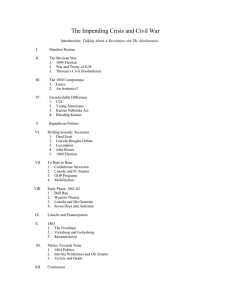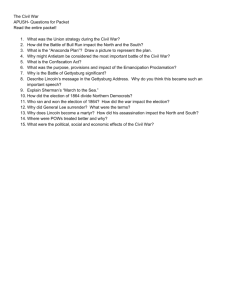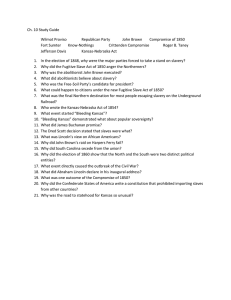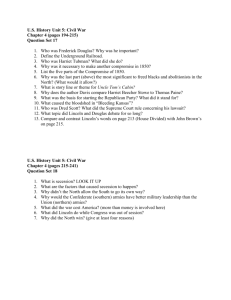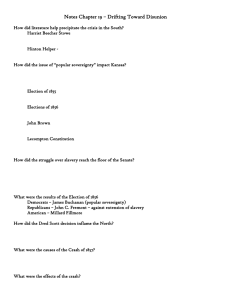AP U.S. History-Meyers Name_______________________________
advertisement
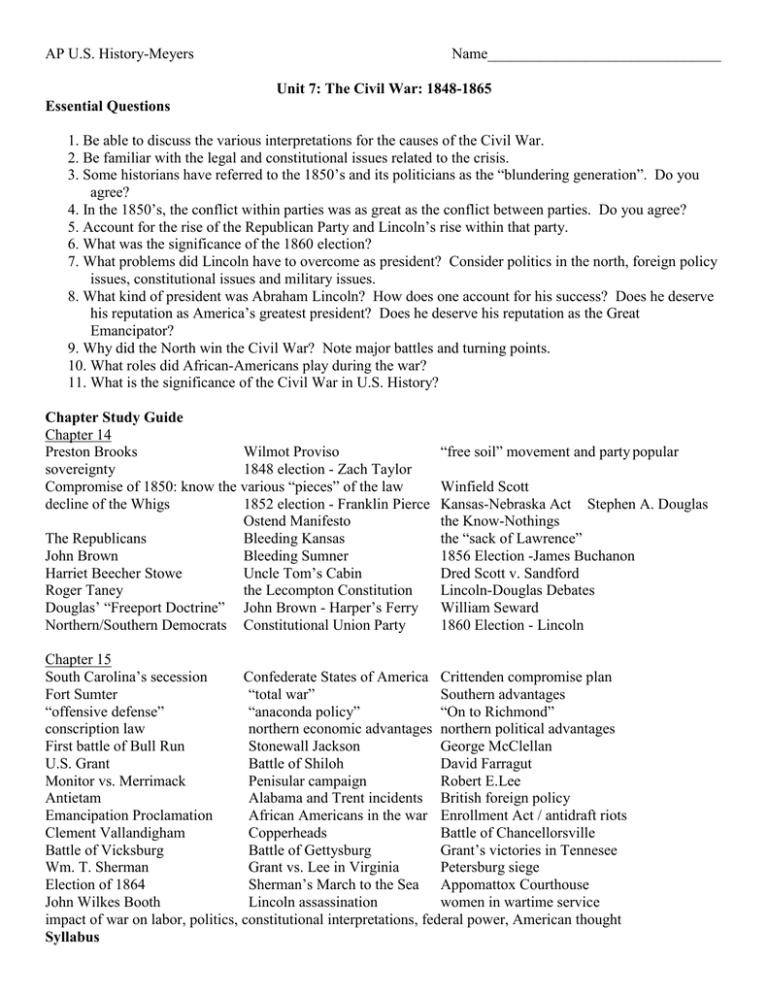
AP U.S. History-Meyers Name_______________________________ Unit 7: The Civil War: 1848-1865 Essential Questions 1. Be able to discuss the various interpretations for the causes of the Civil War. 2. Be familiar with the legal and constitutional issues related to the crisis. 3. Some historians have referred to the 1850’s and its politicians as the “blundering generation”. Do you agree? 4. In the 1850’s, the conflict within parties was as great as the conflict between parties. Do you agree? 5. Account for the rise of the Republican Party and Lincoln’s rise within that party. 6. What was the significance of the 1860 election? 7. What problems did Lincoln have to overcome as president? Consider politics in the north, foreign policy issues, constitutional issues and military issues. 8. What kind of president was Abraham Lincoln? How does one account for his success? Does he deserve his reputation as America’s greatest president? Does he deserve his reputation as the Great Emancipator? 9. Why did the North win the Civil War? Note major battles and turning points. 10. What roles did African-Americans play during the war? 11. What is the significance of the Civil War in U.S. History? Chapter Study Guide Chapter 14 Preston Brooks Wilmot Proviso sovereignty 1848 election - Zach Taylor Compromise of 1850: know the various “pieces” of the law decline of the Whigs 1852 election - Franklin Pierce Ostend Manifesto The Republicans Bleeding Kansas John Brown Bleeding Sumner Harriet Beecher Stowe Uncle Tom’s Cabin Roger Taney the Lecompton Constitution Douglas’ “Freeport Doctrine” John Brown - Harper’s Ferry Northern/Southern Democrats Constitutional Union Party “free soil” movement and party popular Winfield Scott Kansas-Nebraska Act Stephen A. Douglas the Know-Nothings the “sack of Lawrence” 1856 Election -James Buchanon Dred Scott v. Sandford Lincoln-Douglas Debates William Seward 1860 Election - Lincoln Chapter 15 South Carolina’s secession Confederate States of America Crittenden compromise plan Fort Sumter “total war” Southern advantages “offensive defense” “anaconda policy” “On to Richmond” conscription law northern economic advantages northern political advantages First battle of Bull Run Stonewall Jackson George McClellan U.S. Grant Battle of Shiloh David Farragut Monitor vs. Merrimack Penisular campaign Robert E.Lee Antietam Alabama and Trent incidents British foreign policy Emancipation Proclamation African Americans in the war Enrollment Act / antidraft riots Clement Vallandigham Copperheads Battle of Chancellorsville Battle of Vicksburg Battle of Gettysburg Grant’s victories in Tennesee Wm. T. Sherman Grant vs. Lee in Virginia Petersburg siege Election of 1864 Sherman’s March to the Sea Appomattox Courthouse John Wilkes Booth Lincoln assassination women in wartime service impact of war on labor, politics, constitutional interpretations, federal power, American thought Syllabus Wednesday, 11-16 Unit 6 Exam Text 411-417 Thursday, 11-17 Introduction to the Civil War, Phase 1: Compromise of 1850 Text 417-425 Document: Douglas, Bleeding Kansas and Bleeding Sumner Friday, 11-18 Phase 2: Kansas-Nebraska Act and “Bleeding Kansas” Text 425-430 ALL PAGES Document: Uncle Tom’s Cabin Monday, 11-21 Phase 3: The Dred Scott Decision Text 430-438 Documents: Compare S. Carolina’s Declaration of Causes of Secession with Lincoln’s First Inaugural. Be ready to discuss the arguments outlined in each. Tuesday, 11-22 Phase 4: The Election of Lincoln Text 441-448 Wednesday, 11-23 The Outbreak of War, Advantages, Strategy Text 455-460 Monday, 11-28 1861-1862 Text 460-465 Document: The Gettysburg Address Tuesday, 11-29 1863 Text 465-470 Document: Lincoln’s Second Inaugural Wednesday, 11-30 1864-1865 Handout: Life of a Soldier Thursday, 12-1 Civil War Topicals Webquest: Presidential Leadership and Evaluating Presidents Friday, 12-2 Evaluating Lincoln Study! Monday, 12-3 Exam MC and Essay Eric Foner Reading, 67-80
